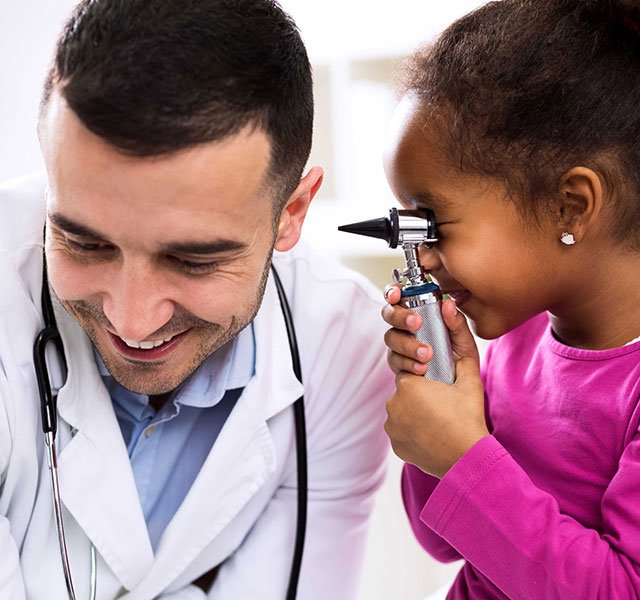“My ear hurts.” Almost every parent hears this complaint from their young child at some point or another.
Ear aches and ear infections are a frequent part of childhood. According to the National Institute on Deafness and Other Communication Disorders (NIDCD), nine out of ten children will have at least one ear infection while growing up. Frequent ear infections occur in one out of five children.
“Common symptoms of an ear infection are ear pain and fever. Children too young to tell you what hurts may cry and fuss and tug at one or both ears,” says pediatrician Elana Ackerman, M.D. “Your child may also be irritable or listless, have trouble hearing or not feel like eating.”
More severe symptoms may include severe ear pain, particularly pain lasting longer than 48 hours, and temperatures of 102.2 degrees or higher.
Ear infections are most common in children between the ages of 6 to 18 months. They become less common after age 3, and even less frequent after age 5. This is because a child’s ear development, particularly the connection between the middle ear to the upper throat and back of the nose (called the eustachian tube) is a contributor. Children’s eustachian tubes are not fully developed until they are about 5 years old.
How to Treat Ear Infections
While many parents expect a prescription for antibiotics when they bring their child in to see a doctor for an ear ache, Dr. Ackerman cautions that it’s not always the right treatment option. “Not all ear aches are ear infections. Even if the ears are infected, most ear infections are caused by viruses, which are not treated with antibiotics,” she says.
Home treatment is often the first course of action, and the specifics depend on your child’s age. “If a child is between 6 to 24 months of age, and ear pain is either right or left-sided, but not both sides, parents can initially monitor at home and treat their child with Motrin and Tylenol, as well as warm compresses,” Dr. Ackerman says. When children are older than 24 months, home monitoring and treatment is advised.
Dr. Ackerman says parents should call their doctor if the child’s symptoms are not improving in 48 hours, or if the parents have any concerns, such as how to keep the child hydrated or significant worsening of symptoms.
When a child has multiple ear infections, surgery to place tubes in the ear (tympanostomy) is sometimes performed.
“Ear tubes help provide temporary drainage until children grow and their eustachian tubes mature,” says Dr. Ackerman, who adds that hand-washing and vaccines can help prevent ear infections. “The flu vaccine is particularly important, since viruses (including the flu) are the most common cause of ear infections.”
To find a pediatrician or family medicine provider at Henry Ford or make an appointment, visit henryford.com or call 1-800-HENRYFORD (436-7936).
Dr. Elana Ackerman is a board-certified pediatrician, seeing patients at Henry Ford Medical Center – Farmington Road in West Bloomfield.



